Jason Hughes, Managing Director of Imperial Bricks, looks at why bricks are used again and again in public sector projects, and the importance of an ethical supply chain.
Imperial Bricks
Look around any town, city or village in the UK, and you’ll see buildings made of bricks; schools, libraries, council buildings, health centres and more. Practical, strong and incredibly durable, brick construction is a long-established build method in the UK, dating back to Roman times. Today, traditional handmade, extruded and pressed bricks are more popular than ever, and with good reason. The right brick can add kerb appeal and value, ensuring a refurbishment or extension blends in seamlessly with original brickwork, or that a new build sits well alongside existing architecture. This is even more important in conservation areas, of course.
Sourcing and specifying bricks that meet the requirements of your projects and are reliably available at the quality and quantity required – not to mention, the budget – can be difficult.
Location, location, location
Shades, sizes and styles of bricks vary considerably across the UK. The availability of local clay is what gave different regions of the UK their distinctive variations in brick colours. Southern England tends to have more soft reds, London clay is distinctly yellow, while east coast clays are gault or buff, and the Midlands and North predominantly produce oranges and darker red bricks. In some areas of the UK, local clay is no longer available in the volume required to meet demand and, therefore, bricks are sourced from overseas.
Brick manufacturing in the UK totals around 1.9 billion bricks a year, but demand outstrips this by around 500 million. The shortfall is primarily imported from Europe and Asia. But whether bricks are made in the UK or abroad, it’s vital to ensure they are made and supplied ethically, tested for UK weather conditions and meet recognised standards for quality and environmental management as a minimum.
Many other products are imported into the UK for construction and other industries; food, clothing, cars, consumer goods, construction materials and more. Without these our economy would not survive. In the past decade or so, there has been a greater (and welcome) focus on the supply chain to ensure that products are made to commonly-recognised standards and requirements. This is particularly true in the construction industry where there has been an increased emphasis on correct product manufacture, testing and supply following the Grenfell fire disaster in 2017.
The ongoing consultation and creation of the Code for Construction Product Information (CCPI) will put quality assurance processes under even more scrutiny. Indeed, there are a small number of unprofessional companies and distribution agents in the UK brick market working with factories in and outside of Europe, issuing copycat products without the necessary quality assurance testing.
But no industry – and no country – is infallible. For example, fast fashion retailer, Boohoo, cut ties with 64 factories in Leicestershire last year following ‘modern slavery’ accusations, with workers undertaking long shifts for as little as £3.50 per hour.
Where a product is made matters less than how it is made and supplied. Being able to evidence this with independent audits and internationally-recognised standards is a must.
What accreditations should I look for?
Given the commitment of British companies, and the public sector, in particular, to stamp out modern slavery and ensure sustainability and ethical employment practices, assurance of methods of manufacture and working conditions are vital. The Brick Development Association recently established a Brickmakers Quality Charter, with manufacturers who have signed up scoring between one and three stars depending on the certification met.
Others, such as Imperial Bricks, operate by partnership with carefully-selected factories that meet at least four of the highest internationally-recognised standards, as follows:
• UKCA/CE Mark – CPR Compliance in clay brick products
• SEDEX Members Ethical Trade Audit (SMETA) Report
• Anti-Modern Slavery Policy
• ISO 9001 Business Quality Management System
• BES 6001 Responsible Sourcing
• ISO 14001 Environmental Management System
• ISO 45001 Health and Safety Management System.
Imperial is able to stipulate these standards as a requirement thanks to the long-term, exclusive trading relationships with our partner factories. Our bricks are made to our exact specification, using our own expertise and that of our manufacturing partners’, working in a similar way to M&S and Dyson, who are also SEDEX members.
As a legal minimum, UKCA/CE marking and testing should be met by any product being sourced or supplied for UK construction projects. For example, Imperial’s bricks are tested by the leading independent third-party certification body, Lucideon, for freeze-thaw, water absorption, dimensions, soluble salt content and compressive strength. Such testing ensures products are suitable for the UK market and can withstand all that the British climate can throw at them.
Any public sector organisation planning works involving bricks should ensure its contractors and suppliers meet or exceed an equivalent set of standards to those outlined above. In this way, supply chains, procurement practices and policies supporting ethical standards and employment practices can be demonstrated and assured.









